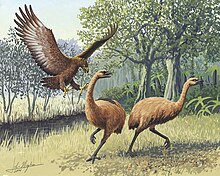The pouākai (also spelled poukai) is a monstrous bird in Māori mythology.[1][2]
 The Haast's eagle, which may have inspired the Pouākai | |
| Grouping | Birds of prey |
|---|---|
| Sub grouping | Eagles |
| Folklore | Māori |
| Country | New Zealand |
| Region | South Island |
Mythologies
editIn some of these legends, the Pouākai kills and eats humans. The myth may refer to the real but now extinct Haast's eagle: the largest known eagle species, which was able to kill an adult moa weighing up to 230 kilograms (510 lb), and which potentially had the capability to kill a human.[3]
History
editHaast's eagles, which lived only in the east and northwest of New Zealand's South Island, did not become extinct until around two hundred years after the arrival of Māori. Eagles are depicted in early rock-shelter paintings in South Canterbury.[4] Large amounts of the eagle's lowland habitat had been destroyed by burning by AD 1350, and it was driven extinct by overhunting, both directly (Haast's eagle bones have been found in Māori archaeological sites) and indirectly: its main prey species, nine species of moa and other large birds such as adzebills, flightless ducks, and flightless geese, were hunted to extinction at the same time.[5]
See also
editReferences
edit- ^ Rodgers, Paul (14 September 2009). "Maori legend of man-eating bird is true". The Independent. Retrieved 14 September 2009.
- ^ "Pouākai – The world's largest eagle". RNZ. 30 July 2021. Retrieved 13 December 2023.
- ^ Casey, Michael (14 September 2009). "Extinct New Zealand eagle may have eaten humans". United States: ABC News. Associated Press.
- ^ Worthy, Trevor H.; Holdaway, Richard N. (2002). The Lost World of the Moa. Bloomington, IN: Indiana University Press. pp. 333–334. ISBN 0-253-34034-9.
- ^ Worthy, Trevor H.; Holdaway, Richard N. (2002). The Lost World of the Moa. Bloomington, IN: Indiana University Press. ISBN 0-253-34034-9.[pages needed]